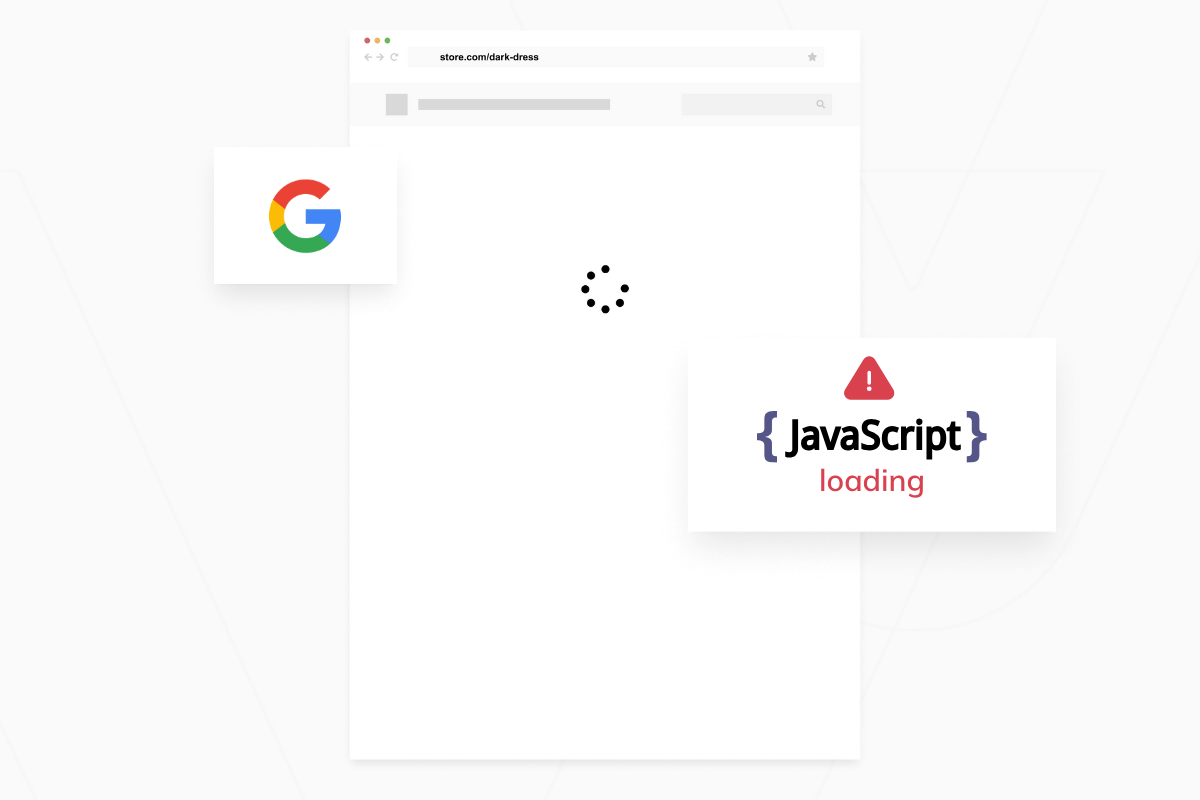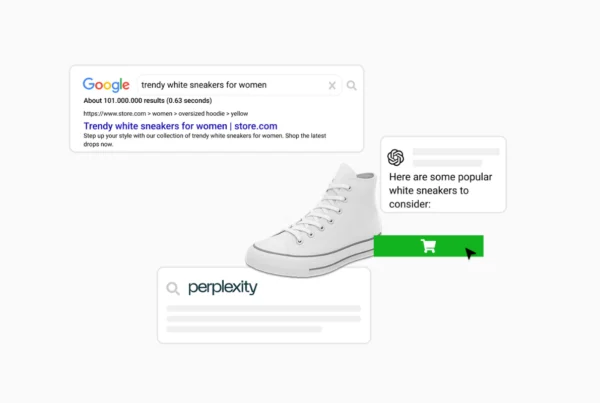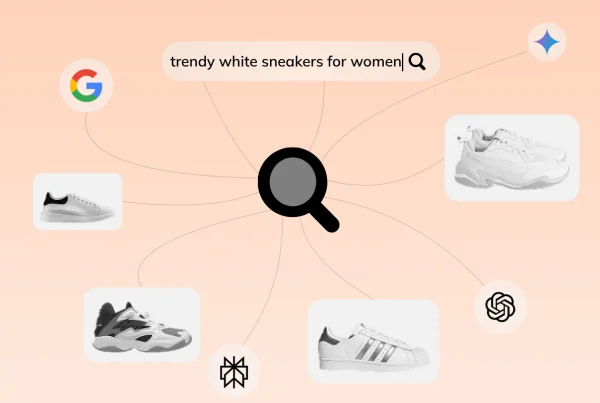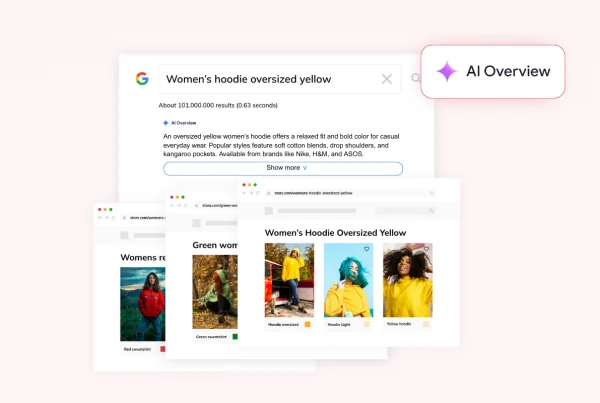How does JavaScript affect Google crawling?
Estimated reading time: 4 minutes

JavaScript powers smooth transitions, engaging interactions, and dynamic content on modern e-commerce sites. It’s a core reason why users love browsing your site.
But what about Googlebot? Can JavaScript-heavy websites hurt your SEO, slow down indexing, or reduce your visibility on Google? And what about AI search engines?
The answer is nuanced. Let’s unpack how JCan avaScript affects Google crawling and what you can do to optimize for both users and crawlers.
JavaScript is a programming language that makes websites interactive and dynamic. It runs directly in the user’s browser, allowing pages to respond to actions, display animations, update content without reloading, and more.
Examples include:
- Product images changing on hover
- Drop-down menus
- Live chat windows
- Product filtering and cart updates in e-commerce
Web pages typically use HTML, CSS, and JavaScript together:
- HTML (HyperText Markup Language) structures the page.
- CSS (Cascading Style Sheets) styles the page.
- JavaScript enables interactivity and dynamic behavior.
While HTML and CSS are delivered by the server and rendered by the browser, JavaScript executes on the client side (in the user’s browser), enabling instant updates without reloading the page.
How JavaScript helps your SEO
JavaScript can enhance SEO performance because it improves user experience:
- Faster page transitions
- Rich interactions with your content
- Longer time on site and lower bounce rates
These are positive signals for SEO, indicating high engagement and relevance.
The challenge: Google Crawling JavaScript
Because JavaScript is executed on the client side, the browser (or crawler) downloads your page structure first, then runs JavaScript to build the final view.
This process consumes time and resources for crawlers.
For JavaScript-heavy sites, this can:
- Use up your crawl budget
- Slow down indexing
- Delay the discoverability of new content
While Google advises “Focus on your users,” helping crawlers efficiently access your content is still critical for SEO.
Heavy JavaScript pages take longer for Googlebot to process, meaning it will crawl fewer pages in the same timeframe compared to a lightweight site.
AI search engines and JavaScript: a critical challenge
It’s not just Google you need to consider. AI bots like ChatGPT, Perplexity, and other generative search engines currently cannot execute JavaScript at all.
If your content relies on JavaScript to display critical information, these AI bots:
- Can’t see your content
- Can’t cite your pages in AI-generated answers
- Won’t send traffic to your site from AI search results
As AI-powered search engines gain traction, ensuring your content is bot-readable without JavaScript dependencies is crucial for future-proofing your visibility.
Solution to JavaScript for SEO performance: Pre-render your pages for Googlebot and AI bots
What is pre-rendering for SEO?
Pre-rendering means serving a fully rendered HTML version of your JavaScript-heavy pages to crawlers while maintaining the interactive JavaScript experience for users.
Why pre-rendering matters for SEO
Pre-rendering a page has multiple benefits:
- Faster crawling and indexing
- Reduced load on Googlebot
- No risk of missing critical content during crawls (especially for AI bots that can’t read JavaScript)
Using pre-rendering technologies makes your content accessible to bots while maintaining an interactive user experience.
Action plan: What should you do if you have JavaScript on your website?
- Audit your site: Identify key pages relying heavily on JavaScript for critical content.
- Consider pre-rendering: Use solutions to deliver crawlable HTML to bots while maintaining a JS-rich UX for users.
- Monitor crawl stats: Track crawl frequency and page indexing in Google Search Console.
- Optimize structured data: Ensure bots can easily understand your content.
- Test page speed: Keep JavaScript efficient to avoid slowing down crawlers.
Conclusion
JavaScript is not inherently bad for SEO; it’s essential for modern websites. However, without managing its impact on crawlers, you risk slower indexing, reduced visibility, and missed opportunities in both traditional and AI-powered search engines like ChatGPT, Perplexity,….
By combining a great user experience with crawler-friendly practices, like pre-rendering your JavaScript-heavy pages, you can future-proof your SEO while delivering the best possible experience to your visitors.
FAQ: JavaScript and SEO
Does JavaScript hurt SEO?
JavaScript isn’t inherently bad for SEO. It enhances user experience, which is a positive signal for search engines. However, it can make crawling and indexing slower or incomplete if search engine bots struggle to render JavaScript-heavy content which is especially the case for AI bots.
Can Googlebot crawl JavaScript?
Yes, Googlebot can crawl and render JavaScript, but it requires more resources and time. This can use up your crawl budget and delay indexing.
Do AI search engines like ChatGPT and Perplexity read JavaScript content?
No, AI bots like ChatGPT and Perplexity currently cannot execute JavaScript. If your critical content only loads via JavaScript, these AI bots won’t see it, which means your site won’t get cited or recommended in AI-generated answers.
What is pre-rendering, and how does it help with SEO?
Pre-rendering serves a fully rendered HTML version of your page to crawlers while keeping your JavaScript-rich experience for users. This ensures bots can see your content instantly, improving crawl efficiency, indexation speed, and discoverability.
Is JavaScript or pre-rendering better for SEO in 2025?
A balanced approach is best:
- JavaScript enhances UX and engagement (important for SEO).
- Pre-rendering ensures bots (including AI bots) can read your content efficiently.
For e-commerce brands, using pre-rendering on key pages ensures fast indexation while keeping your site dynamic and user-friendly.
About The Author
How can Verbolia help your e-commerce platform.


